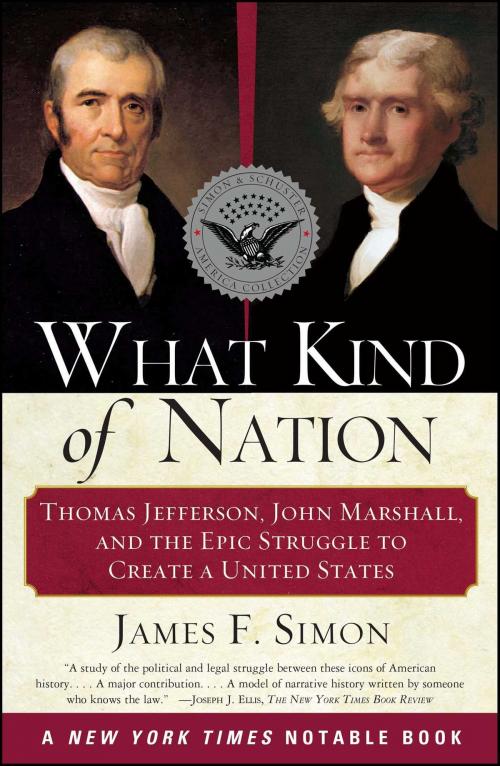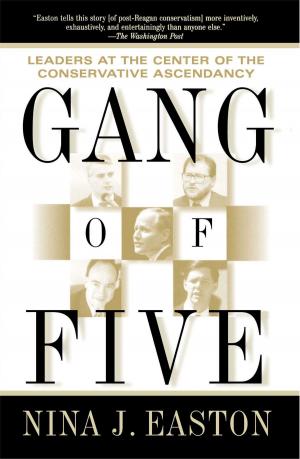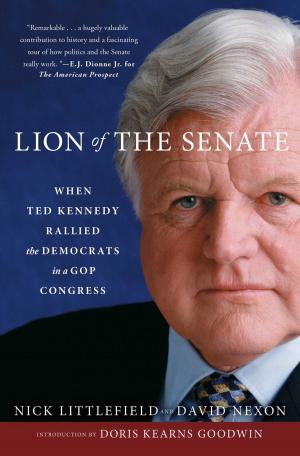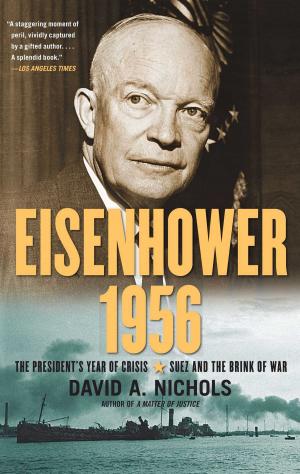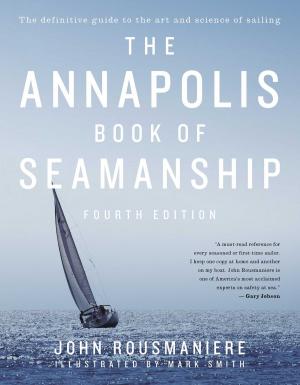What Kind of Nation
Thomas Jefferson, John Marshall, and the Epic Stru
Nonfiction, History, Americas, United States| Author: | James F. Simon | ISBN: | 9781439127636 |
| Publisher: | Simon & Schuster | Publication: | February 21, 2012 |
| Imprint: | Simon & Schuster | Language: | English |
| Author: | James F. Simon |
| ISBN: | 9781439127636 |
| Publisher: | Simon & Schuster |
| Publication: | February 21, 2012 |
| Imprint: | Simon & Schuster |
| Language: | English |
What Kind of Nation is a riveting account of the bitter and protracted struggle between two titans of the early republic over the power of the presidency and the independence of the judiciary.
The clash between fellow Virginians (and second cousins) Thomas Jefferson and John Marshall remains the most decisive confrontation between a president and a chief justice in American history. Fought in private as well as in full public view, their struggle defined basic constitutional relationships in the early days of the republic and resonates still in debates over the role of the federal government vis-à-vis the states and the authority of the Supreme Court to interpret laws.
Jefferson was a strong advocate of states' rights who distrusted the power of the federal government. He believed that the Constitution defined federal authority narrowly and left most governmental powers to the states. He was suspicious of the Federalist-dominated Supreme Court, whose members he viewed as partisan promoters of their political views at the expense of Jefferson's Republicans. When he became president, Jefferson attempted to correct the Court's bias by appointing Republicans to the Court. He also supported an unsuccessful impeachment of Federalist Supreme Court Justice Samuel Chase.
Marshall believed in a strong federal government and was convinced that an independent judiciary offered the best protection for the Constitution and the nation. After he was appointed by Federalist President John Adams to be chief justice in 1801 (only a few weeks before Jefferson succeeded Adams), he issued one far-reaching opinion after another. Beginning with the landmark decision Marbury v. Madison in 1803, and through many cases involving states' rights, impeachment, treason, and executive privilege, Marshall established the Court as the final arbiter of the Constitution and the authoritative voice for the constitutional supremacy of the federal government over the states.
As Marshall's views prevailed, Jefferson became increasingly bitter, certain that the Court was suffocating the popular will. But Marshall's carefully reasoned rulings endowed the Court with constitutional authority even as they expanded the power of the federal government, paving the way for later Court decisions sanctioning many pivotal laws of the modern era, such as those of the New Deal, the Great Society, and the Civil Rights Act of 1964.
In a fascinating description of the treason trial of Jefferson's former vice president, Aaron Burr, James F. Simon shows how Marshall rebuffed President Jefferson's claim of executive privilege. That decision served as precedent for a modern Supreme Court ruling rejecting President Nixon's claim that he did not have to hand over the Watergate tapes.
More than 150 years after Jefferson's and Marshall's deaths, their words and achievements still reverberate in constitutional debate and political battle. What Kind of Nation is a dramatic rendering of a bitter struggle between two shrewd politicians and powerful statesmen that helped create a United States.
What Kind of Nation is a riveting account of the bitter and protracted struggle between two titans of the early republic over the power of the presidency and the independence of the judiciary.
The clash between fellow Virginians (and second cousins) Thomas Jefferson and John Marshall remains the most decisive confrontation between a president and a chief justice in American history. Fought in private as well as in full public view, their struggle defined basic constitutional relationships in the early days of the republic and resonates still in debates over the role of the federal government vis-à-vis the states and the authority of the Supreme Court to interpret laws.
Jefferson was a strong advocate of states' rights who distrusted the power of the federal government. He believed that the Constitution defined federal authority narrowly and left most governmental powers to the states. He was suspicious of the Federalist-dominated Supreme Court, whose members he viewed as partisan promoters of their political views at the expense of Jefferson's Republicans. When he became president, Jefferson attempted to correct the Court's bias by appointing Republicans to the Court. He also supported an unsuccessful impeachment of Federalist Supreme Court Justice Samuel Chase.
Marshall believed in a strong federal government and was convinced that an independent judiciary offered the best protection for the Constitution and the nation. After he was appointed by Federalist President John Adams to be chief justice in 1801 (only a few weeks before Jefferson succeeded Adams), he issued one far-reaching opinion after another. Beginning with the landmark decision Marbury v. Madison in 1803, and through many cases involving states' rights, impeachment, treason, and executive privilege, Marshall established the Court as the final arbiter of the Constitution and the authoritative voice for the constitutional supremacy of the federal government over the states.
As Marshall's views prevailed, Jefferson became increasingly bitter, certain that the Court was suffocating the popular will. But Marshall's carefully reasoned rulings endowed the Court with constitutional authority even as they expanded the power of the federal government, paving the way for later Court decisions sanctioning many pivotal laws of the modern era, such as those of the New Deal, the Great Society, and the Civil Rights Act of 1964.
In a fascinating description of the treason trial of Jefferson's former vice president, Aaron Burr, James F. Simon shows how Marshall rebuffed President Jefferson's claim of executive privilege. That decision served as precedent for a modern Supreme Court ruling rejecting President Nixon's claim that he did not have to hand over the Watergate tapes.
More than 150 years after Jefferson's and Marshall's deaths, their words and achievements still reverberate in constitutional debate and political battle. What Kind of Nation is a dramatic rendering of a bitter struggle between two shrewd politicians and powerful statesmen that helped create a United States.
